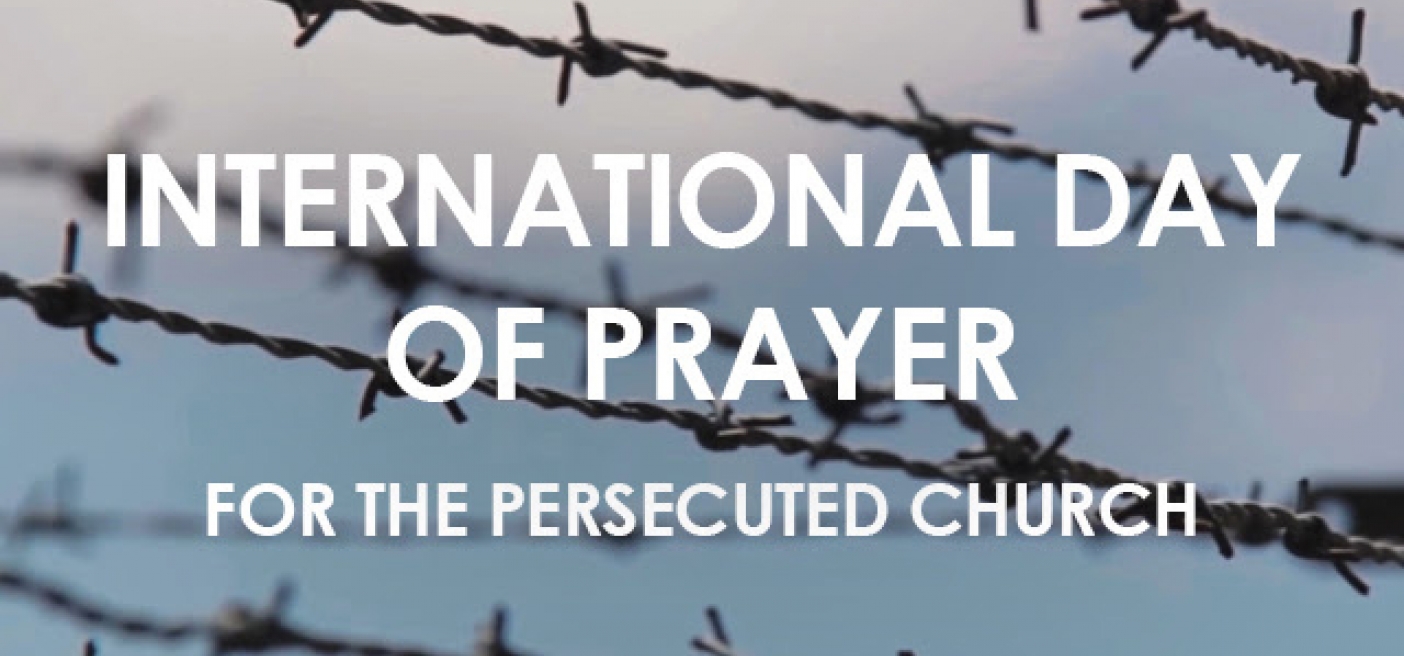November 3: 2019 International Day of Prayer for the Persecuted Church

Remember those in prison, as though you were in prison with them, and the mistreated, as though you yourselves were suffering bodily. Hebrews 13:3
Each year, Christians in the free world stand together for the International Day of Prayer for the Persecuted Church, with believers who live out their faith in the face of harassment, attacks, false imprisonment, and even death. Nik Ripken shares, “70% of the world’s Christians who are practicing their faith live in persecution.” In more than 60 countries around the globe, 215 million believers face high levels of persecution because of their decision to follow Jesus in places that are hostile to Christianity.
The Bible has a lot to say about how the world will treat followers of Jesus. "If the world hates you, understand that it hated me before it hated you,” Jesus says in John 15:18. Most of us have never experienced that kind of hate, and certainly not for our faith! God’s Word shows us that persecution has been a part of His story throughout history. God’s prophets and Jesus’ disciples were persecuted, and the story of the early Church in the New Testament is the story of persecution. If you look at Scripture, it’s written largely by persecuted believers, written for persecuted believers, and written to give instruction on how to walk with God in often-unthinkable situations.
The last few years have seen a significant escalation of persecution in China. Christians have been compelled to renounce their faith with the threat of expulsion from school and loss of jobs and benefits; Bibles burned, crosses destroyed, religious material confiscated and churches closed. (It's not just China, see links below for more articles and information.)
Ed Stetzer writes:
I worry that there’s a growing trend amongst Christians living in the West—a problem of ignorance. Is the church here in the U.S. truly aware of what’s happening to their brothers and sisters overseas? I think, and I fear, that many pastors, churches, and church attendees simply are not.To clarify, persecution in these individual’s terms doesn’t look like side-glances from a coworker or rude comments from a neighbor about a front yard nativity scene. Cultural opposition towards faith is real here in the United States and especially in Europe—but it’s not persecution in the same sense that pastor Mingri and his congregation in Beijing know it to be.
Persecution for many followers of Jesus looks like abduction, rape, detainment in prison, or loss of life and limb. It looks like gathering to worship on a Sunday morning all to find that your church’s cross has been burned, gathering spaces decorated with Communist propaganda, and sacred images stolen.
It looks like living in fear of ethnic cleansing, terrorism, and organized crime all as penalty for living as a follower of Jesus in the presence of an antagonistic government and culture.
The persecution that these Chinese Christians and countless others are experiencing is real. It’s not just discomfort, it’s not just harassment, it’s not just mistreatment, it’s the kind of “fiery trial” that Peter spoke of in 1 Peter 4:12—one that endangers believer’s economic stability, safety, and sometimes even their very lives.
Their suffering does not go unnoticed by God, and so it should never go unnoticed by us. Ignorance is not an excuse; we’ve been compelled to act. (China on My Mind: Why We All Must Care about Our Suffering Brothers and Sisters)
We may feel far from the issue due to geography and cultural barriers, but that should not stop us from getting on our knees on their behalf. They are brothers and sisters in Jesus, and loving them is not optional. Praying for them can be the primary way we express our unity with them. They covet our prayers.
The Insanity of God (B&H 2013) is the true story of missionaries Nik and Ruth Ripken. After the death of their son, they journeyed into the depths of the persecuted church, asking the question - IS JESUS WORTH IT? How does faith survive, let alone flourish in the places of the world that are over come with the darkness of sin, despair, and hopelessness? The Ripkens tell the story of being taught by believers in persecution "how to follow Jesus, how to love Jesus, and how to walk with Him day by day even when it doesn't make sense." They interviewed over 700 persecuted Christians, in 72 countries. They write:
"And we are able now to say with confidence that God uses persecution and suffering for His purposes. Exactly why God uses persecution and suffering is a holy mystery, but the fact that He does use persecution and suffering is a certainty! Crucifixion and resurrection are central themes of the gospel story. Believers in persecution bring these themes into present active tense today as they live out their faith in harsh and horrible environments." – Insanity of Obedience (B&H 2014) p. 12
Nik writes: “Much to our surprise, believers in persecution did not ask us to pray that their persecution would cease. Instead, they begged us to pray that they would be obedient through their suffering. And that is a very different prayer.” – Insanity of Obedience, p. 34
We must pray. But what else can we do? Ripken writes:
"There is perhaps only one thing more difficult than releasing our own lives into the hands of God, and that is releasing the lives of our loved ones, especially our children. What risks are we willing to shoulder, including risks for our wives and children, for the sake of the kingdom of God? When we ask churches in the West this question, there is often a deafening silence; we are still waiting for an answer.
What is the hardest task? Going? That might be difficult, but that is not the hardest task. Staying? Yes, as we have already noted, that is hard. But the hardest task of all may be sending: giving and blessing our sons and our daughters to serve the Nations.
Which is harder: dying on a cross or sending the one most loved to die on a cross? Most parents would willingly die on a thousand crosses if that would keep their children from dying on one! But both the sending and the dying are intrinsic to the nature of God.
When the Body of Christ recaptures the true responsibility of sending loved ones to the Nations, it will either experience a profound season of mission renewal, or it will stop sending.
The Western church often idolizes its children. Bargaining with God and holding back our children so that they might experience “the good life” of the American dream is to believe a lie that ultimately causes the church to deny the Nations the best the Father has to offer. And it ushers in the demise of the church itself." – Insanity of Obedience, p. 81
Recently talking with one of our International Mission Board workers relocated due to increased persecution, I lamented, “I am so disappointed for the new believers you have begun discipling, and those with whom you have been building relationships and sharing the gospel.” The reply, “They are repeating history here. And the last time, the body went underground and multiplied like nothing ever before. So that's been my ask.” I’m now praying, “Lord, do it again.” (See Insanity of Obedience, p. 190)
Information for this article was gathered from several sources. For more information go to:
- www.nikripken.com
- www.opendoorsusa.org
- www.persecution.com
- http://www.bpnews.net/53823/china-frees-christian-prisoner-amid-ongoing-persecution
- http://www.bpnews.net/53802/persecuted-algerians-confident-in-god-convert-says
- http://www.bpnews.net/53749/one-christian-killed-12-kidnapped-in-nigeria
- http://www.bpnews.net/53744/ukrainian-believers-standing-on-our-knees
- https://prayercast.com/china.html
- www.christianitytoday.com/edstetzer/2018/september/china-on-my-mind-why-we-all-must-care.html
- www.erlc.com/resource-library/articles/explainer-chinese-officials-burn-bibles-and-close-churches-in-latest-round-of-persecution
- www.bpnews.net/51586/china-shutters-churches-demands-recant-of-faith
- www.epm.org/blog/2018/Sep/28/increased-persecution-china-and-what-chinas-digita
- www.epm.org/resources/2010/Mar/22/how-pray-persecuted-church/
For Resources and Ideas to Engage Your Church in IDOP go to:
https://www.opendoorsusa.org/webinars/resources-and-ideas-to-engage-your-church-in-idop/

Bestselling author Nik Ripken, mentored by believers in persecution, offers a 90-day devotional to help you align your heart with God’s, seeing the role sacrifice plays in the life of every follower of Jesus Christ.
Individuals and families will be challenged to embrace sacrifice as their daily offering to God. It is through offering ourselves that we mirror the nature of the Father who gave His only Son to be crucified, and the nature of the Son who gave His very life to save sinners. Through this book readers will discover that their sacrifice can lead others, across the street and across the oceans, to discover new resurrection life in Christ.
To watch Nik Ripken's 2018 message at Jersey Church go to: https://vimeo.com/299086090

_______________________________
Persecution reminds us of the truth of the gospel: Following God has never been about us. It has always been about Him.
_______________________________

https://prayercast.com/china.html
_______________________________
“Much to our surprise, believers in persecution did not ask us to pray that their persecution would cease. Instead, they begged us to pray that they would be obedient through their suffering. And that is a very different prayer.”
_______________________________
How do you know what to pray for?
Nik and Ruth Ripken first published this information at www.nikripken.com
We are commanded to remember those who are going through persecution. It is easy for us to pray for our brothers and sisters in persecution, but to do so with insight sometimes is very difficult. How do we even know where to start? What should we do in order to pray with intelligence? Because of security concerns, it is often hard to know specific names and places.
Here are a few suggestions:
- Do a prayer walk or drive through parts of your city where internationals are found. Take your family and model these kinds of prayers for your children. You will be blessed as you hear them pray. As you see restaurants or shops pray for the employees. Allow God to bring these locations to your mind as you pray. Stop in for a meal and meet the workers. Find out where they are from and begin to intentionally pray for them over the following days and weeks.
- Listen to international news and pray for the places that are mentioned.
- Correspond with someone who lives in another part of the world and ask them to share with you ways that you can pray. If they live in a location where it is difficult to be a follower of Jesus ask them how best to communicate with them.
- If there are people from other countries in your workplace, ask about their family – are they still in the country? Are they okay? Invite the family to your home for a meal.
- Download the Open Doors App and use this tool to pray specifically for situations globally. www.opendoorsusa.org/prayerapp
_______________________________

